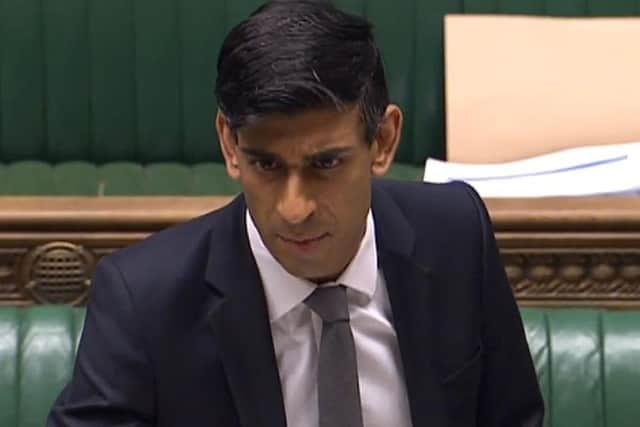200,000 business owners are under unimaginable strain, MPs warn Chancellor


More than 60 MPs have backed a proposal from the All Party Parliamentary Group on Gaps in Support to remove the £50,000 cap on trading profits for future Self-Employed Income Support Scheme (SEISS) grants.
In a statement, the group said: "Currently, self-employed people can claim SEISS on trading profits up to £50,000 per annum. However, while someone with profits of £49,999 is eligible for significant support, someone with profits of £50,001 has received nothing.
Advertisement
Hide AdAdvertisement
Hide Ad"With the Budget due next month, the APPG on Gaps in Support submitted a policy proposal to HM Treasury that would see the £50,000 cap scrapped from future SEISS grants. The Government’s Self-Employed Income Support Scheme (SEISS) statistics suggests that 200,000 people have been ineligible for government support as a result of this arbitrary cap."


In a letter to the Chancellor Rishi Sunak, a cross-party group of MPs led by Conservative members of the APPG Esther McVey MP (co-chair) and Philip Davies MP, highlighted the “instrumental” role that business owners and higher rate taxpayers will play in the UK’s economic recovery and urged the Government to “support every single business”.
The cross-party letter states: “Our entrepreneurs, and self-employed self-starters, were a driving force behind the UK’s pre-pandemic ascent to the top of the G7 economic growth charts. They will also be instrumental in Britain’s economic recovery – on the condition they are provided with the necessary support to survive this bleak period.
"We ask you to consider the livelihoods and wellbeing of these people, their staff, and their families. It takes courage and determination to start a business, and even more courage to expand a business through investment and hard work. We cannot penalise these people with such an arbitrary cap that does not incentivise the expansion of British business."
Advertisement
Hide AdAdvertisement
Hide AdThe support, worth up to £7,500, could also be offered as part of the Targeted Income Grant Scheme (TIGS), which the APPG on Gaps in Support recently proposed. The cross-party proposal puts forward two options for the Treasury to support this group: The fourth grant for SEISS is based on no upper cap on trading profits or a TIGS grant of £7,500.
The statement added: "If claim rates match that of existing SEISS grants, this would cost HM Treasury £787.5m – a fraction of the sums spent on financial support schemes for other groups during the pandemic. By comparison, the Coronavirus Job Retention Scheme has no upper cap, meaning that a high-income employee can be furloughed and receive £2,500 per month, or £7,500 per quarter."
"If this policy is accepted, then it should also be extended to the directors of small limited companies under either the Directors Income Support Scheme (DISS) or TIGS."
The MPs said that removing the £50,000 cap means the policy would be “simple to administer, fraud-resistant and affordable for the country.”
Advertisement
Hide AdAdvertisement
Hide AdEsther McVey MP, co-chair of the APPG and a signatory to the letter, said: “The £50,000 cap on trading profits has arbitrarily left more than 200,000 people without government support for nearly a year, depriving them of an income and placing them under unimaginable strain.
“With no current plans to ease the lockdown, the Government must support every single business that they are asking to close.
“The policy we are suggesting would be simple to administer, fraud-resistant and affordable. There is no excuse to delay its introduction.”
Philip Davies MP, co-signatory and member of the APPG, said: "We cannot ignore the gaps in support for those who have received nothing at all throughout this pandemic. Such exclusion is causing real damage to business owners personally and to the country’s economic potential.
Advertisement
Hide AdAdvertisement
Hide Ad“The wholly arbitrary £50k ceiling insults many of our country’s business owners, entrepreneurs and employers - the very same people the Government will rely on to rebuild the economy whenever this lockdown misery comes to an end."
Rebecca Seeley Harris, who designed the proposal, said: “The £50,000 cap on trading profits unfairly punishes those who spearheaded Britain’s ascent to the top of the pre-pandemic G7 growth charts.
“It will be higher rate taxpayers who trade us out of this crisis, turbocharging our economic recovery and creating secure jobs. Continuing to ignore this hole in the Government’s support schemes would be both cruel and economically illiterate.”
A HM Treasury spokesperson said: “Our self-employed and furlough schemes are among the most generous in the world and have protected over 12 million jobs since the start of the pandemic.”
Advertisement
Hide AdAdvertisement
Hide Ad“Funding is designed to target those who need it most and protect the taxpayer against fraud and abuse. Those not eligible may still be able to access our loans schemes, tax deferrals, mortgage holidays and business support grants. “
"We’ve invested £280bn throughout the pandemic to protect millions of jobs and businesses - and extended our self-employed and furlough schemes through to April to give businesses the certainty they need to plan over the winter months.
The spokesman added: "We have done all we can to help as many people as possible; but for those that have not been eligible it has often been for reasons like mitigating the risk of fraud.
"Around 95 per cent of those with more than half their income from self-employment in 2018-19 could be eligible for the SEISS Grant Extension Grant. Those who receive at least half of their income from working as an employee, and that work would make them eligible for support from government schemes such as the furlough scheme.
Advertisement
Hide AdAdvertisement
Hide AdThe spokesman added: "We invested billions in strengthening our welfare safety net, ensuring it’s more generous and accessible for those who need it.
"The temporary welfare measures include a £20 per week increase to the Universal Credit standard allowance and Working Tax Credit basic element. We increased the Local Housing Allowance rates for Universal Credit and Housing Benefit claimants and relaxed the Universal Credit minimum income floor."
Support The Yorkshire Post and become a subscriber today. Your subscription will help us to continue to bring quality news to the people of Yorkshire. In return, you'll see fewer ads on site, get free access to our app and receive exclusive members-only offers. Click here to subscribe.